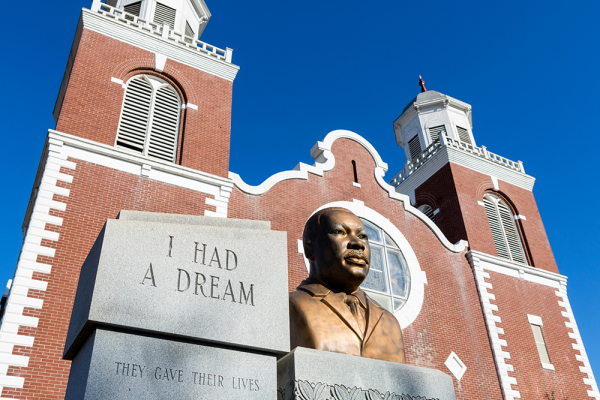Each Martin Luther King Jr. Day, I am reminded how prophetic his message was — how astutely he diagnosed the United States’ problems, and sadly, the degree to which we are still wrestling with these same problems today. But MLK Day is not just a day to remember Rev. Martin Luther King Jr.’s legacy; it’s a day to act upon his bold vision to save the soul of America. This commitment to action is even more imperative this year in the face of the mounting assault on voting rights and crisis facing our democracy.
While King’s vision can’t be reduced to one quote or issue, in A More Perfect Union I make the case that the Beloved Community — which King saw as the north star and end goal of the civil rights movement — is the most holistic definition of King’s dream. Across many of his sermons and speeches, King emphasized that the Beloved Community combines a deep commitment to equality, nonviolence, justice, and selfless and unconditional agape love. In my contemporary remix, I define the Beloved Community as the process of cocreating communities, nations, and a world in which neither punishment nor privilege is tied to race, ethnicity, gender, ableness, or sexual orientation and where everyone is respected, valued, and enabled to thrive. It’s a bold and hopeful vision that begs the question: What is most sabotaging its realization?
On April 4, 1967, one year to the day before his assassination, King gave a speech at New York City’s Riverside Church that provided a powerful and timeless answer. In the address, entitled “Beyond Vietnam,” King famously spoke on the evils of the United States’ war in Vietnam. But perhaps equally important was the way in which King framed the need to transform U.S. society by dismantling “the giant triplets of racism, extreme materialism, and militarism.” He pointed out that unless we fundamentally transform the structures of U.S. society to address the root causes, the problems of racism, poverty, and war will continue to plague us. He also explained that the three giant triplets are interrelated such that one cannot be solved in isolation from the others.
When we look at society today, it’s clear that these giant triplets of racism, extreme materialism, and militarism are still very much with us. I’m also confident that if he were still alive, King would add climate change as a fourth triplet that is tied to and exacerbated by the original three.
Racism continues to damage our democracy and assault human dignity. While the record-breaking protests in the summer of 2020 ignited an awakening around the ongoing crisis of racialized police violence and systemic racism, Congress has all but given up on passing federal legislation to make long-overdue reforms to policing, let alone the deeper transformations that are so necessary. The growing backlash in school board meetings over how we teach and reckon with our past represents the latest form of racial retrenchment.
While there have been some gains in economic justice and fighting poverty, the United States is inordinately more wealthy and profoundly more unequal than at the height of King’s life. The quicksand of poverty remains a pervasive reality for over 37 million Americans. While the 2021 expansion of the child tax credit cut child poverty nearly in half, this critical benefit expired when Congress failed to move forward the Build Back Better reconciliation package, which would have extended the expanded tax credit for one more year.
And while politicians fight over every dollar that goes toward social support programs (especially programs that tend to help people of color), the one massive piece of spending that sails through Congress each year with overwhelming bipartisan approval is the military budget, which now stands at a staggering $778 billion per year. As King said more than 50 years ago, “A nation that continues year after year to spend more money on military defense than on programs of social uplift is approaching spiritual death.” U.S. leadership in the world desperately needs to shift from an overly militaristic paradigm to one that further embraces peacemaking and nonviolence and prioritizes sustainable development.
If we as Christians agree about these integral connections between racism, poverty, and war, then we can best honor King this MLK Day not by simply sharing quote memes, but by taking action to counter these interrelated evils. To counter extreme materialism and the economic inequities it perpetuates, we can advocate for the Build Back Better legislation, which has the potential to transform the U.S. economy in ways that will advance racial equity and enable all families and communities to thrive. To counter militarism, we can advocate for international spending that focuses on diplomacy and development rather than war-making, partner with groups that lift up practical alternatives to violence like the Catholic Nonviolence Initiative, and join groups like the Abolition Action Committee that are working to end the death penalty by protesting the Jan. 17 anniversary of Gary Gilmore’s execution by firing squad in Utah in 1977 — the first U.S. execution after the Supreme Court reinstated the death penalty a year earlier.
And most critically, we can honor King’s vision by working to restore the voting rights that he knew were so central to dismantling racism in this country. As King proclaimed, “Voting is the foundation stone for political action.” Two bills that would restore these protections, which have now been combined into another bill and will be voted on in the House today — the Freedom to Vote Act and John Lewis Voting Rights Advancement Act — have stalled in the Senate because of the filibuster, a procedural rule that minority parties have used to delay voting on any bill that fails to gain two-thirds of senators’ support. We must call on our senators to find the moral courage to choose democracy over this procedural rule. If the Senate can find the will to change its rules to raise the debt ceiling with simple majority vote, it can and must do the same to protect our very democracy. King himself spoke out against the filibuster and the way it was so often used to block civil rights legislation.
This MLK Day, we need action, not just speeches. We have joined members of the King family in cosponsoring the Martin Luther King Jr. Day of Action: Deliver for Voting Rights. Our leaders should not waste this historic opportunity to restore and protect the sacred right to vote. I can’t think of a better and more urgent way to honor King and help us to renew his vision for the Beloved Community.
Got something to say about what you're reading? We value your feedback!







